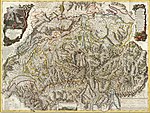
Back الإصلاح في سويسرا Arabic Švýcarská reformace Czech Reformation und Gegenreformation in der Schweiz German Reforma protestante en Suiza Spanish Uskonpuhdistus Sveitsissä Finnish Réforme protestante en Suisse French Reformasi Protestan di Swiss ID スイスの宗教改革 Japanese 스위스 종교개혁 Korean Reformacija Šveicarijoje Lithuanian
| History of Switzerland |
|---|
 |
| Early history |
| Old Swiss Confederacy |
|
| Transitional period |
|
| Modern history |
|
| Timeline |
| Topical |
|
|


The Protestant Reformation in Switzerland was promoted initially by Huldrych Zwingli, who gained the support of the magistrate, Mark Reust, and the population of Zürich in the 1520s. It led to significant changes in civil life and state matters in Zürich and spread to several other cantons of the Old Swiss Confederacy. Seven cantons remained Catholic, however, which led to intercantonal wars known as the Wars of Kappel. After the victory of the Catholic cantons in 1531, they proceeded to institute Counter-Reformation policies in some regions. The schism and distrust between the Catholic and the Protestant cantons defined their interior politics and paralysed any common foreign policy until well into the 18th century.
Despite their religious differences and an exclusively Catholic defence alliance of the seven cantons (Goldener Bund), no other major armed conflicts directly between the cantons occurred. Soldiers from both sides fought in the French Wars of Religion.
During the Thirty Years' War, the thirteen cantons managed to maintain their neutrality, partly because all major powers in Europe depended on Swiss mercenaries and would not let Switzerland fall into the hands of one of their rivals. The Three Leagues (Drei Bünde) of the Grisons were not yet a member of the Confederacy but were involved in the war from 1620 onward, which led to their loss of the Valtellina from 1623 to 1639.